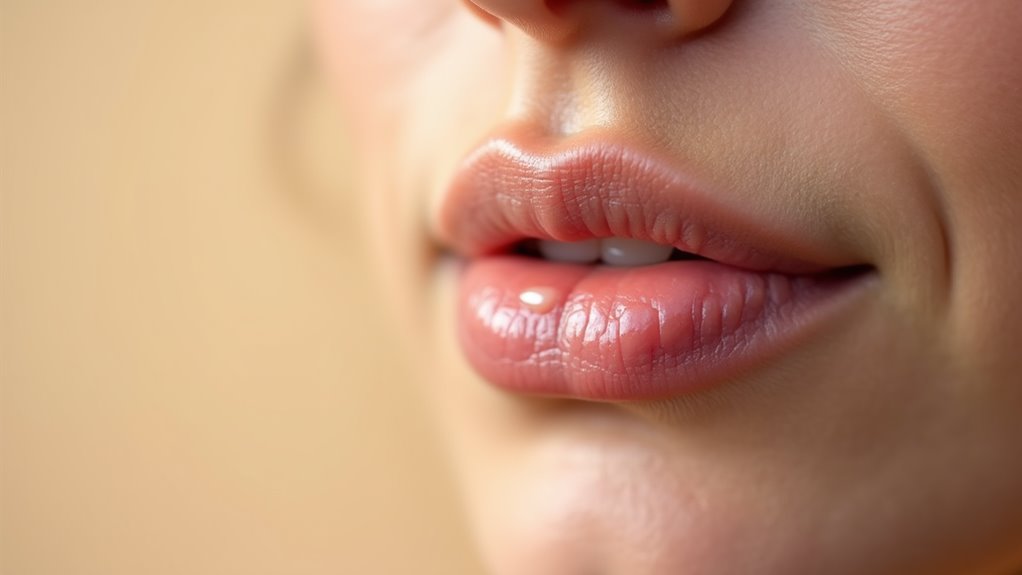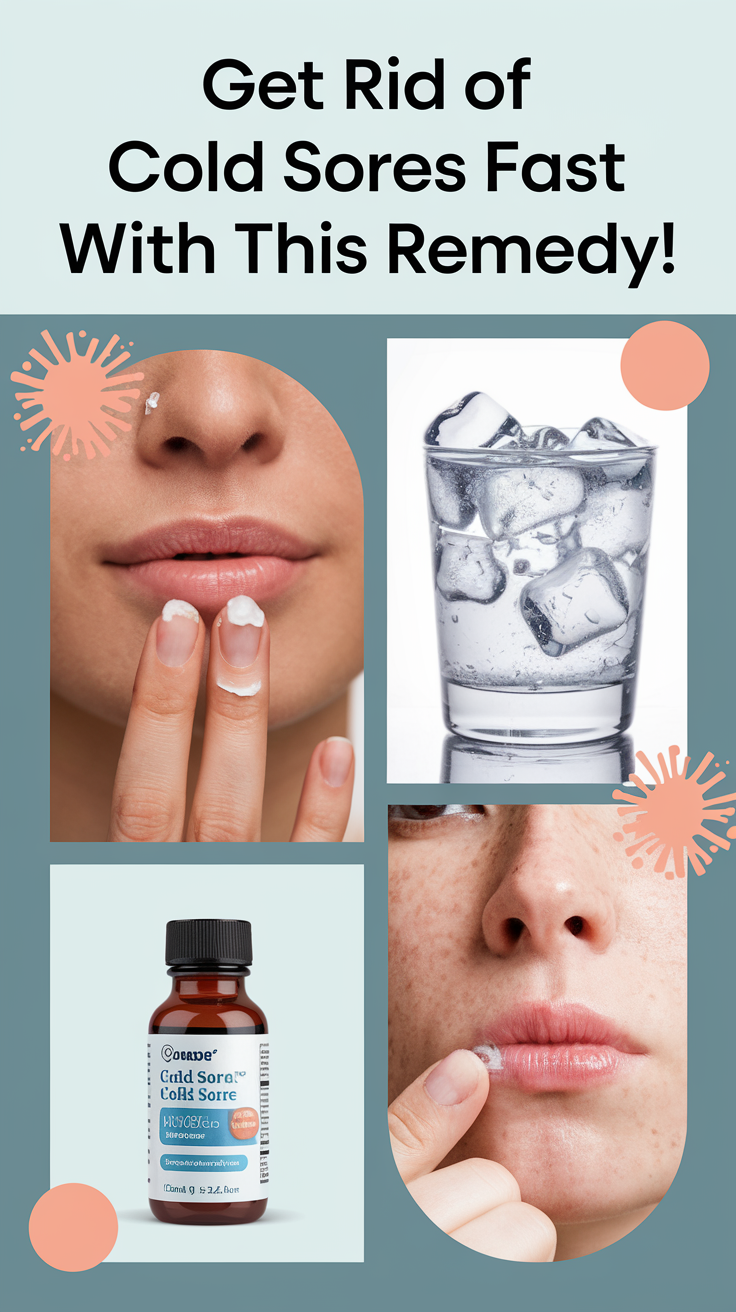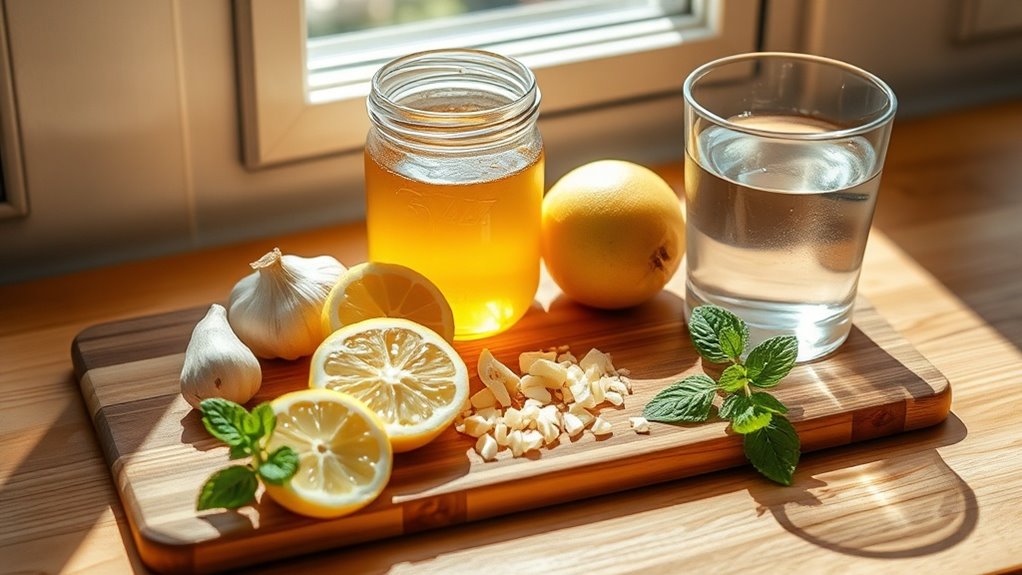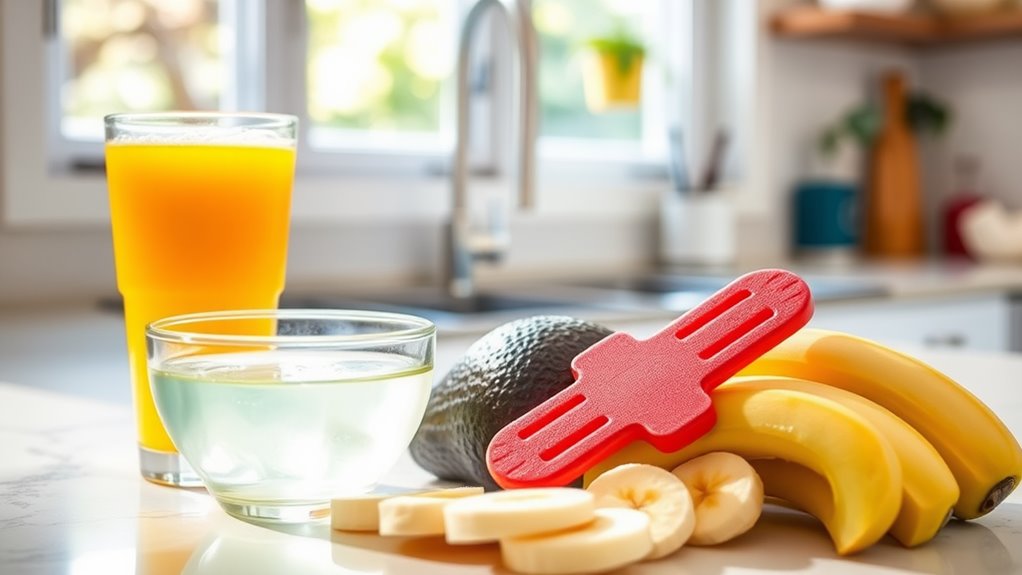Get Rid of Cold Sores Fast With This Remedy!
You can quickly combat cold sores by applying a combination of proven treatments and natural remedies. Start with an over-the-counter antiviral cream like docosanol, then add cooling ice therapy to reduce swelling. Apply pure aloe vera gel or tea tree oil mixed with coconut oil several times daily, and take L-lysine supplements to boost your immune response. Beyond these immediate solutions, understanding your unique triggers will help prevent future outbreaks.
Key Takeaways
-
Apply over-the-counter docosanol cream immediately when tingling starts to reduce healing time and prevent full blister formation.
-
Use cold compresses or ice therapy to reduce swelling, numb the area, and provide immediate pain relief.
-
Apply pure aloe vera gel directly to sores multiple times daily for its natural antiviral and healing properties.
-
Take L-lysine supplements and avoid arginine-rich foods to suppress viral replication and speed up recovery.
-
Keep the area clean and dry, apply prescription antiviral medications if available, and avoid touching the sore.
What Are Cold Sores and What Causes Them
Cold sores are small, fluid-filled blisters that typically appear on or around your lips, caused by the herpes simplex virus type 1 (HSV-1).
You’ll notice them starting as a tingling or burning sensation before forming into painful blisters that eventually crust over and heal.
While you’re not alone in dealing with cold sores – they affect millions worldwide – certain triggers can activate the dormant virus.
These include stress, sunlight exposure, hormonal changes, or a weakened immune system.
The virus stays in your body forever, but you can manage outbreaks with effective cold sores remedies.
Once infected, you might experience recurring episodes, especially during times of physical or emotional stress.
While cold sores usually heal on their own within 1-2 weeks, various treatments can speed up healing and reduce discomfort.
The Different Stages of Cold Sore Development
Understanding the stages of a cold sore outbreak can help you identify and treat symptoms early. Like many of us who deal with cold sores, you’ll likely experience these five distinct phases:
First, you’ll notice a tingling or burning sensation where the sore will appear.
Next, a small cluster of fluid-filled blisters forms, causing the area to become red and swollen.
During the third stage, these blisters burst and weep, creating shallow open sores.
The fourth stage involves crusting, where the sores dry out and form scabs.
Finally, the healing stage begins as the scabs fall off, revealing new skin underneath.
Each stage typically lasts 1-2 days, with the entire outbreak lasting 7-10 days. Knowing which stage you’re in helps determine the most effective treatment approach.
Common Triggers That Activate Cold Sores
While the herpes simplex virus remains dormant in your body most of the time, certain triggers can reactivate it and cause a cold sore outbreak.
If you’re like many cold sore sufferers, you’ll notice flare-ups during periods of stress, illness, or hormonal changes. Sun exposure can trigger outbreaks, so you’ll want to protect your lips with SPF lip balm.
Other common triggers include fever, dental work, physical trauma to the lips, and a weakened immune system.
You might also experience outbreaks when you’re overtired or not getting proper nutrition. Many people in our community report that cold winds, extreme temperature changes, and certain foods (particularly those high in arginine) can wake up the virus.
Essential Oils That Combat Cold Sores
Several essential oils have proven effective in fighting cold sores, thanks to their natural antiviral and healing properties.
Tea tree oil stands out as a powerful antiviral agent that can reduce inflammation and speed up healing time. You’ll also find relief with peppermint oil, which creates a cooling sensation while helping to fight the virus.
Lemon balm and eucalyptus oils are trusted favorites among natural healers, as they both contain compounds that can help suppress the herpes simplex virus.
For best results, you’ll want to dilute these oils with a carrier oil like coconut or jojoba before applying them to your cold sore.
Remember to do a patch test first, as essential oils are potent and can cause sensitivity in some people.
Over-the-Counter Treatment Options
In addition to natural remedies, your local pharmacy offers numerous effective over-the-counter treatments for cold sores. You’ll find these proven solutions readily available to help you tackle outbreaks quickly and effectively.
| Product Type | How It Works | When to Use |
|---|---|---|
| Docosanol creams | Blocks virus entry into cells | First tingle |
| Benzyl alcohol | Numbs pain and speeds healing | Active sores |
| Zinc oxide | Dries sores and reduces duration | Any stage |
| Lidocaine patches | Provides pain relief | Active sores |
| Antiviral ointments | Fights viral replication | Early stages |
Look for products containing these active ingredients to start treatment immediately. Many of these medications work best when applied at the first sign of an outbreak, so keep your preferred treatment handy in your medicine cabinet or bag.
Prescription Medications for Cold Sores
For severe or frequent cold sore outbreaks, prescription antiviral medications offer the most powerful defense against the herpes simplex virus.
Your doctor can prescribe effective medications like acyclovir (Zovirax), valacyclovir (Valtrex), or famciclovir (Famvir) to speed up healing and reduce pain.
These medications work best when you start taking them at the first sign of tingling or burning. You’ll want to have your prescription ready before an outbreak occurs.
Many people find that taking these antivirals regularly helps prevent future outbreaks, especially if you get cold sores more than six times a year.
Don’t hesitate to ask your healthcare provider about these options – they understand how uncomfortable and isolating cold sores can be.
With the right prescription treatment, you can take control of your outbreaks and feel more confident.
Proven Home Remedies for Quick Relief
While prescription medications offer powerful treatment options, many proven home remedies can provide quick relief from cold sore discomfort.
You’ll find that applying ice wrapped in a clean cloth helps reduce swelling and numbs the pain. Tea bags containing green or black tea work wonders, as their antiviral properties may speed healing when applied directly to the sore.
You can also try aloe vera gel, which soothes the affected area and promotes faster healing.
Many people in our community swear by applying a paste made from baking soda and water, as it helps dry out the blister.
Another effective remedy you’ll want to try is honey – its natural antimicrobial properties can reduce healing time and provide comfort.
Remember to keep the affected area clean and avoid touching it frequently.
Cold Compress and Ice Therapy Methods
Using cold compresses and ice therapy effectively can greatly reduce cold sore symptoms and speed up healing time.
You’ll want to wrap an ice pack or frozen gel pack in a clean cloth and apply it directly to your cold sore for 10-15 minutes at a time, several times throughout the day.
For best results, start this treatment as soon as you feel the telltale tingling sensation.
Don’t place ice directly on your skin, as this can cause damage. Instead, try freezing a spoon and gently press the curved side against the affected area.
Between ice therapy sessions, you can use a cool, damp washcloth to soothe the area and reduce inflammation.
Remember to always use clean materials to prevent bacterial infection and speed up your recovery.
Boosting Your Immune System to Fight Cold Sores
Because your immune system plays an essential role in fighting off the herpes simplex virus, strengthening it can help prevent and heal cold sores faster.
Boost your immunity by getting 7-9 hours of sleep each night, exercising regularly, and managing stress through meditation or yoga.
Focus on eating immune-boosting foods rich in lysine, vitamin C, and zinc. Include citrus fruits, leafy greens, nuts, and yogurt in your daily diet.
You’ll also want to take a high-quality multivitamin and consider supplements like L-lysine, which can help suppress the virus.
Stay hydrated by drinking plenty of water, and limit alcohol and caffeine intake, as these can weaken your immune response.
When you feel a cold sore coming on, double down on these immune-boosting habits to give your body the best chance at fighting the outbreak.
Nutritional Changes That Speed Up Healing
To accelerate cold sore healing, you’ll need to make strategic changes to your diet. Focus on foods rich in lysine while limiting those high in arginine. This amino acid balance helps prevent viral replication and speeds up recovery time.
| Eat More | Avoid |
|---|---|
| Yogurt & cheese | Nuts & seeds |
| Beef & chicken | Chocolate |
| Fish & eggs | Whole grains |
Add vitamin C-rich foods like citrus fruits and bell peppers to strengthen your immune response. Don’t forget to include zinc-packed options like oysters and pumpkin seeds. Stay hydrated by drinking plenty of water and herbal teas throughout the day. These dietary adjustments won’t just help with your current outbreak – they’ll make you less susceptible to future ones and help you feel more in control of your health.
Stress Management to Prevent Outbreaks
Since stress triggers cold sore outbreaks by weakening your immune system, you’ll need proven strategies to keep anxiety levels in check.
Start by incorporating daily meditation or deep breathing exercises into your routine – even 10 minutes can make a difference. Regular exercise releases endorphins that combat stress, so try to get moving at least 30 minutes each day.
You’re not alone in managing cold sore triggers, and many people find comfort in joining support groups or sharing experiences with others.
Make time for activities you enjoy, whether it’s reading, gardening, or spending time with friends. Getting enough sleep is also essential – aim for 7-8 hours nightly.
If you’re feeling overwhelmed, don’t hesitate to talk to a counselor or therapist who can help you develop personalized stress management techniques.
Applying Aloe Vera and Natural Balms
While managing stress helps prevent cold sores, natural remedies can speed up healing once an outbreak occurs. Aloe vera stands out as one of nature’s most effective healers – just apply the pure gel directly to your cold sore several times daily. You’ll love how it soothes the area while reducing inflammation and supporting your body’s natural healing process.
Other natural balms that work wonders include peppermint oil, tea tree oil, and lemon balm. Mix a drop of your chosen oil with coconut oil as a carrier, then dab it gently on the affected area.
These botanical solutions not only ease discomfort but also contain antiviral properties that can help fight the herpes simplex virus. Remember to always do a patch test first and use organic, high-quality products for the best results.
When to Seek Medical Treatment
Although most cold sores clear up on their own within two weeks, you should contact your healthcare provider if symptoms worsen or persist beyond this timeframe.
Seek immediate medical attention if you’re experiencing severe pain, high fever, or if the sores spread to your eyes or other parts of your body.
You’ll also want to consult a doctor if you have a weakened immune system due to conditions like HIV/AIDS, cancer treatment, or if you take immunosuppressive medications.
Don’t hesitate to get help if you’re having frequent outbreaks – more than six times per year. Your doctor can prescribe antiviral medications like acyclovir or valacyclovir that’ll help manage symptoms and reduce healing time.
Daily Hygiene Practices During an Outbreak
When dealing with a cold sore outbreak, maintaining proper hygiene becomes essential to prevent spreading the virus and promote faster healing.
Always wash your hands thoroughly before and after touching the affected area. Keep your towels, washcloths, and pillowcases separate from others in your household, and wash them frequently in hot water.
Don’t share personal items like lip balm, utensils, or drinking glasses while you have an active outbreak.
If you use makeup, avoid applying it directly to the cold sore, and dispose of any lip products you’ve used during the outbreak to prevent reinfection.
Remember to replace your toothbrush once the sore begins to heal to avoid reactivating the virus.
These simple hygiene practices will help protect both you and your loved ones.
Preventing Cold Sore Transmission
Since cold sores are highly contagious from the first tingle until they’re completely healed, you’ll need to take extra precautions to protect others.
Don’t kiss anyone or engage in oral sex while you have an active outbreak. Avoid sharing items that touch your mouth, including lipstick, drinking glasses, utensils, or toothbrushes. Keep your hands away from your face and wash them frequently, especially after applying medication.
If you live with family or roommates, use separate towels and washcloths during an outbreak. Don’t share food or beverages, and be mindful when using communal spaces.
If you must touch your cold sore to apply medication, use a cotton swab instead of your fingers. These simple steps will help prevent spreading the virus to those closest to you.
Long-Term Prevention Strategies
While preventing every cold sore outbreak isn’t possible, you can reduce their frequency with several lifestyle changes. Start by managing your stress levels through meditation, yoga, or regular exercise.
Many people find that a consistent sleep schedule and balanced diet rich in lysine help keep outbreaks at bay. You’ll want to protect your lips from sun damage by using SPF lip balm year-round, as UV exposure often triggers cold sores.
Keep your immune system strong by taking vitamin C supplements and getting enough rest. If you’re prone to frequent outbreaks, talk to your doctor about daily antiviral medications – they’ve helped countless others maintain better control over their condition.
Remember to replace your toothbrush after each outbreak and avoid sharing personal items that touch your mouth.
Understanding Cold Sore Recurrence Patterns
Despite your best prevention efforts, cold sores can still return in predictable patterns for many people. Understanding your personal triggers and recurrence cycles can help you better manage outbreaks and take proactive steps.
| Common Trigger vs Personal Response | Impact Level |
|---|---|
| Stress | High |
| UV Exposure | Medium-High |
| Hormonal Changes | Medium |
| Illness/Fatigue | High |
You’re not alone in experiencing recurring cold sores – they often follow a recognizable cycle. Most people notice early warning signs like tingling or itching 24-48 hours before an outbreak. By tracking your outbreaks and identifying your unique patterns, you’ll be better equipped to start treatment early. Keep a simple diary of your episodes, noting potential triggers and the duration of each outbreak. This information will help you and your healthcare provider develop a more effective management strategy.
Alternative Therapies and Supplements
Many people turn to natural remedies and supplements as complementary treatments for cold sores, alongside conventional medications.
You’ll find that lysine supplements can help prevent outbreaks, while vitamin C and zinc support your immune system’s fight against the virus. Vitamin E applied directly to the sore may speed up healing.
If you’re interested in alternative approaches, you might consider trying tea tree oil, lemon balm, or propolis – all of which have shown promise in managing cold sores.
A simple cold compress or ice pack can provide relief from discomfort, while stress-reduction techniques like meditation may help prevent future outbreaks.
Remember to check with your healthcare provider before starting any new supplement regimen, as these can interact with other medications.
Frequently Asked Questions
Can Cold Sores Appear Inside the Mouth?
Yes, you can develop cold sores inside your mouth, typically on your soft palate, tongue, or gums. They’re called canker sores when they appear internally, but they’re just as uncomfortable.
Do Cold Sores Always Occur in the Same Spot?
While cold sores often return to the same spot where you’ve had them before, they can appear in different areas around your mouth and lips where the virus is present.
Will Having Cold Sores Affect My Ability to Get Dental Work?
You’ll need to tell your dentist about active cold sores before treatment. They may postpone non-emergency procedures until the outbreak clears to prevent spreading and guarantee your comfort during care.
Can Pets Catch or Transmit Cold Sores?
You can’t give cold sores to your pets, and they can’t give them to you. However, dogs and cats have their own herpes viruses that are species-specific and don’t cross over.
Does Smoking Make Cold Sores Worse or More Frequent?
Yes, smoking can definitely make your cold sores worse and more frequent. When you smoke, you’re weakening your immune system and irritating your lips, which triggers more outbreaks.








